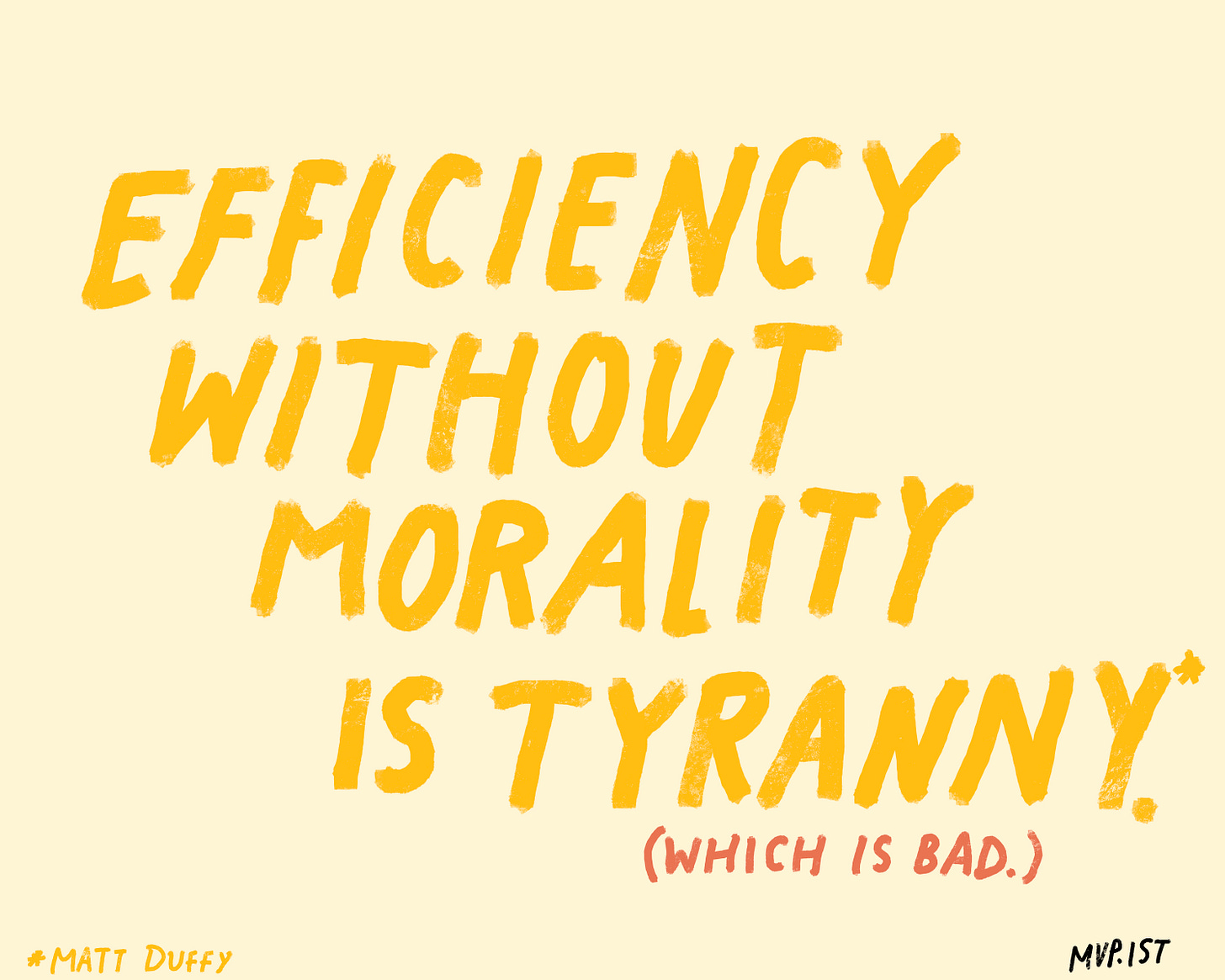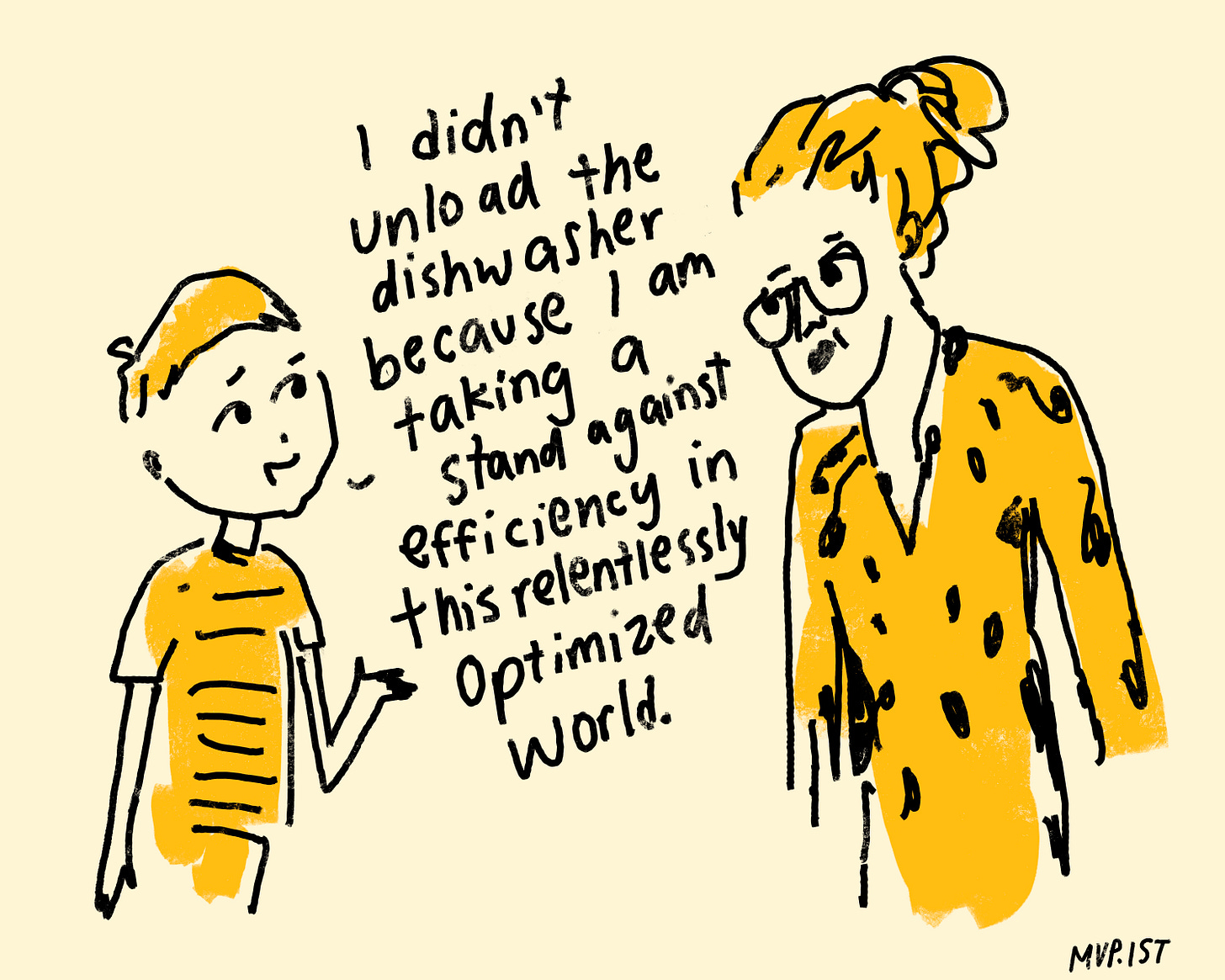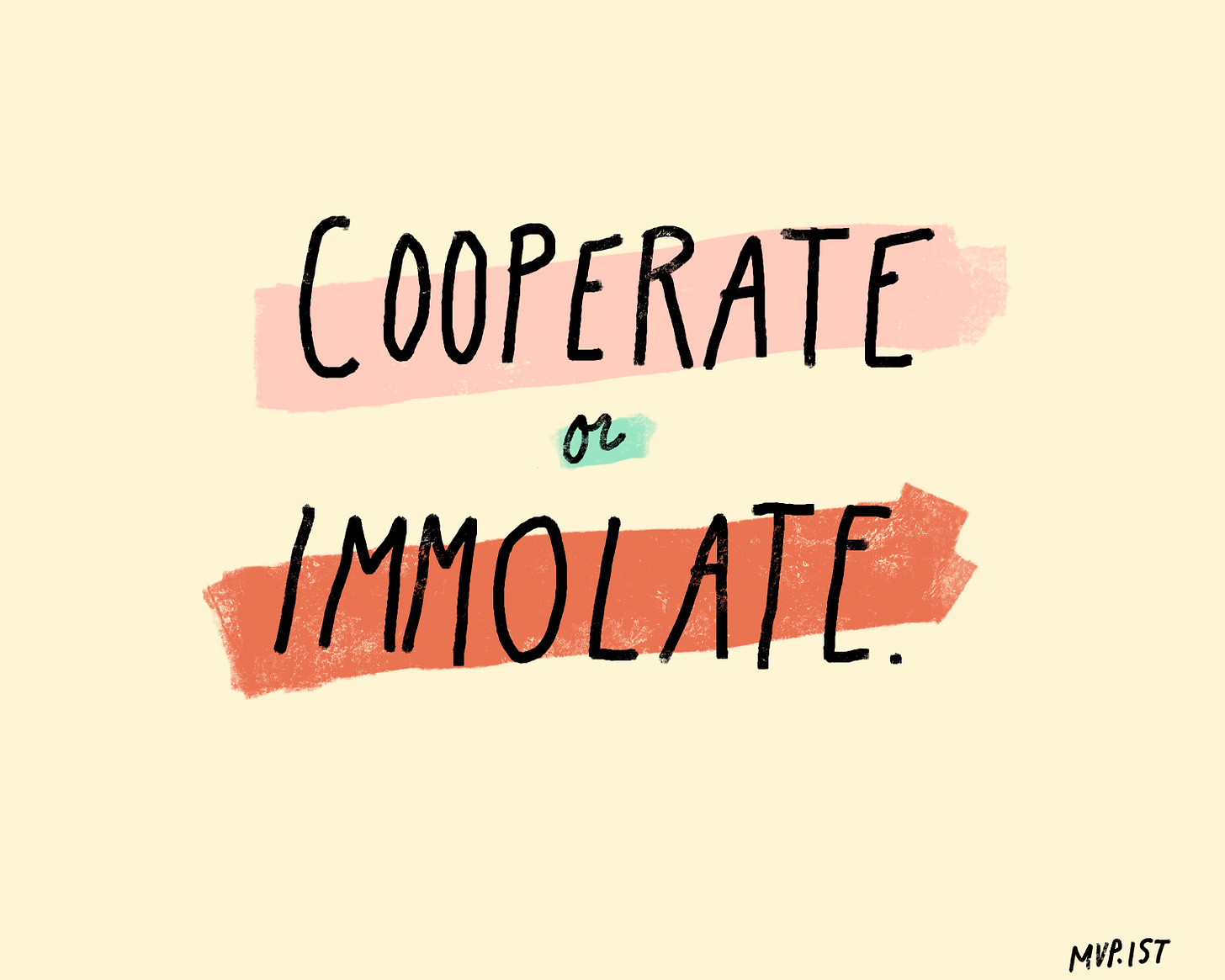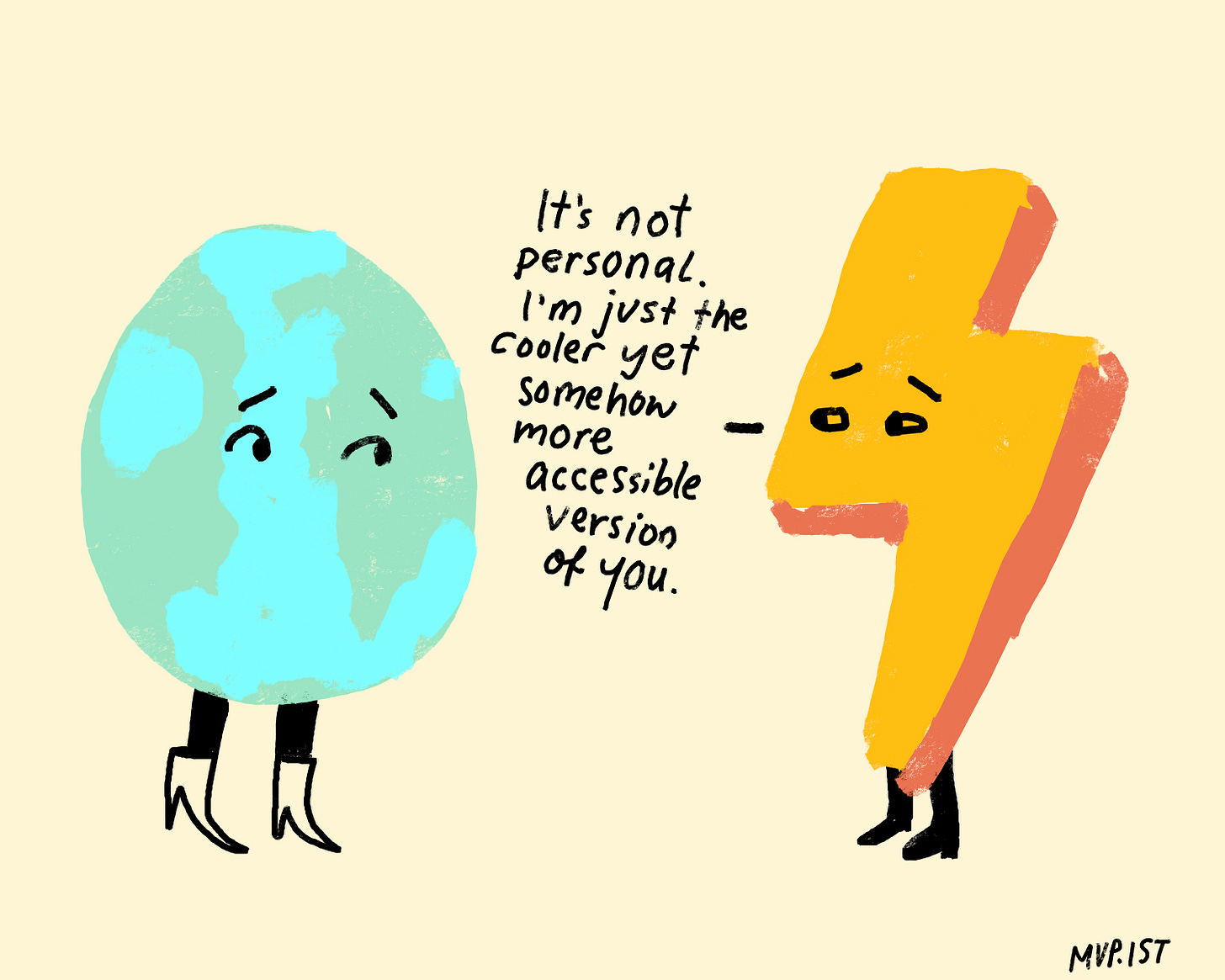Efficiency, equality, electrotech!
a few green shoots in an otherwise wackadoodle time
Hello most valued persons,
It’s taking me longer than anticipated to finish the series I had boldly promised when last I wrote, so here’s a summery soupçon of inspo as I continue to pummel the next two installments of that series into the shape of something readable. I hope you are cool (😎🧊), and that you have an icy beverage in the vicinity. The heat has been merciless and I am grateful for my heat pumps and awnings and the large plastic pool my neighbour gave me I took from my neighbour because I could not bear to see it go to landfill.
If you’re new here thanks to my hero, Rebecca Solnit, welcome! If you’re new here thanks to the mysterious byways of the internet, also welcome! 👋 I’m Sarah. I write and draw about climate communications, and what it means to be alive right now. I also share too many viral dance videos, but you can’t win ‘em all.
Here are three things I’m thinking about: efficiency, collaboration, and electrotech. (That sounds heavy, I promise there’s some fun at the end, like me dancing with my reggaeton crew, and cake. Ok, there’s no cake.)
1 | No efficiency on an amoral planet.
I love this entire essay from Matt Duffy, Efficiency without morality is tyranny. It’s about how digital technologies have sedated us into passivity and further polarized us, destroying community. And it’s one the smartest takes on AI and technocracy that I’ve read. (It could also apply to energy efficiency. No Energy Star on an inequitable planet!) He writes:
To wit, the march of outsourcing wasn’t driven by ignorance, nor was disengagement from real community in favor of weak digital facsimiles of community. We knew factories closing would devastate communities. We knew that online life, while sometimes exciting and helpful, was no substitute for having strong communities in the physical world. We were warned, and decades later, we're still reckoning with hollowed-out towns, forgotten people, and a lack of shared spaces.
The whole essay is spot on, but I’ll pull out a few bits to keep this newsletter short, like hemlines in a canicule: For now I’m simply asking people to notice. Noticing changes our posture—how we look at ourselves, and what we expect from our neighbors.
I’ve had a bit more time to notice lately and it’s precisely in these two categories of introspection, our selves and our neighbours, that I’ve concentrated that noticing. This feels like such a thoughtful way to live in the space between blanket refusal of AI and unchecked acceptance of this relentless digital sweep. We can acknowledge that AI is here, and useful in myriad ways, and also vow to cultivate our own ethics of use (absent the very real global policy interventions we need), to preserve our brains, our relationships, our creative freedoms, and our morality. A moral seriousness, as it were.
We face a fundamental question: will we cultivate a moral framework robust enough to resist technocracy’s logic, or accept our redundancy in a world optimised for everything except being human? Part of the answer lies in small acts of inefficiency – keeping promises, forgiving freely, seeing neighbours and colleagues as more than data points.
In the space of climate and civic renewal, I’ve been thinking about this as where the vibecoding ends, thank you Shel Silverstein. How we can notice more, talk more, be more, in places with people. I’ve been a little less efficient this past month, stopping to chat with people more, pursuing larks, not ticking as many things off my to do list. And it’s been rewarding. (Slow down ✅ Irony ✅ ✅ .)
2 | There’s increasing consensus as to what we need to do to preserve climate and democracy.
It feels like we’ve been frozen for six months, watching and waiting and watching some more. Funders, save for the bold who expanded their giving immediately, have largely clutched their purses tight. People stopped hiring. Everyone held their breath. But while it’s formative yet, it does feel like a nascent crossweave is emerging, an understanding that holistic solutions and collaborative action is the cure for what ails us. Folks know, broadly, what needs to be done: we must invest in non-transactional relationships that support the building of social capital, in ways that reconcile the multiple crises we face (climate, democracy, the pistachio shortage).
It’s the how that’s harder. The cooperation and shared systems building required. On a recent ep of Open Circuit about making the grid smarter, guest and hosts talked about the grid, of course, but the conversation was actually an argument, made in musical metaphor, about connectivity and cooperation. If you are interested in both grid interconnectivity and orchestra mechanics, you can do no better than listen to Katherine Hamilton explain that the grid needs to be like an orchestra. The argument: if an errant second violin (👀) drops out of a complicated run, that’s ok, because the rest of the orchestra is in perfect harmony. Except the orchestra is the grid, and my rusty second violin is a transformer in Topeka. We need this cooperation dearly if we’re to make distributed power plants work for us, and the world. This is no easy feat, of course. Guest Arushi Sharma Frank speaks expertly about seas of Powerwalls not talking to their utilities. We need that to change. But that’s doable, manageable, not moonshotty. If someone can just get that marimba to pay attention.
Am I overly bullish on the prospect of cooperation? I think not, if successful collab means massive shared benefit and profit, and unsuccessful cooperation means a dead planet. These seem like good motivators, both.
3 | It’s all about the electrostate.
Kingsmill Bond is doing some of the best data and writing on the energy transition out there, and this piece is no exception. He very clearly breaks down the difference between generation (solar! renewables!) and electrification (final use energy! 60% of our fossil fuel usage!). As someone who has been working to amplify the importance of the latter for years, I am biased, but also, this is the story of our world and our time. What is it all about? Decoupling the power and the powered better illuminates which nations are making real progress towards achieving the goal of an electrostate, which requires progress on both fronts. Why does this matter? Because we could produce all the abundant electrons in the world, but if we don’t electrify our end use (swapping that gas car for…an e-bike!), it won’t amount to a hill of beans in this crazy world. Or it will, but those beans will be leaching methane in a landfill.
Even with the inane, tarriffy headwinds, electric generation is unstoppable, as Bond’s charts demonstrate. This is because it’s just cheaper to build solar. And also, because gas turbines are back-ordered to 2303. Regardless, it’s on the demand side of electrification that there is so much room for improvement. These products save money, and make people’s lives better. And once you go electric you do not want to switch back.
These are upgrades people notice. They go beyond saving money and enhance daily life. This is what surveys show as well: people who switch to EVs and heat pumps do not want to switch back and recommend the technology to others. That’s why any serious political push to accelerate the energy transition should focus on electrification. It’s where the benefits are clearest and most immediate.
So if you’re wondering why I talk about heat pumps all day, now you know. For me, this is the key climate change story we should be telling because it’s about things that resonate with people…that they have to do anyway (cook, heat their homes). Whether we say the words climate change is immaterial. It’s the materiality itself that matters. (But also, saying the words climate change is fine.)
For those who feel down about climate ranking ever-lower on the prioritization queue, the electrotech opportunity is also a palliative. Because lots of the things that rank higher (cost! of! living!) are solved by end-use electrification. The trick is just getting people to know this. But if we solve for human connection (item 1 in this newsletter) and collaborative, systemized action (2), we’re on the way.
Just last week, a neighbour emailed me saying she wanted to do heat pumps in her reno. The problem: said reno was already very much in progress, and her contractor didn’t think they were good. It was a matter of two phone calls to connect her to the right people to help make sure the house got pumps (thanks, Rich!). For the residents of this multi-unit home, that means increased comfort, greater temperature control, lower bills, air conditioning! And all it took was conversation and connection. (Loss aversion is also a great tool!)
Nothing is easy and the world is a mess, but stopping fossil fuel lock-in one neighbour at a time, is restorative. 11/10 would recommend.
This planet
What’s up? What’s on your mind right now. Let me know.
Last planet
It’s the democracy, stupid. Thank you, Kathleen, for sharing this! A good reminder that everywhere, people are building, connecting, growing:
Things
→ Thursday (TODAY!!!!), June 25th, 12 PM EST: Trusted messengers. I’m excited to chat about one of the most effective projects I’ve ever gotten to work on (and the data isn’t even all in yet!) I’m joining a panel of brilliant and hilarious folks (stars from Generation180, Climate Power, and the Climate Advocacy Lab!) to talk trusted messengers, building community, and Amplifiers, a creative clean energy and community-building training. Join if ya can!
→ An absolute gem of a read from the perfectly named Kara Joy.:
→ Dewiring: I’m moving on from my day job at wonderful Rewiring America. I am still working on some super fun stuff in electrification (+ climate comms), but taking a break for a month. If I’ve not gotten back to one of your notes, or just want to chat, drop me a line! July is for improving my French and catching up with friends and acquaintances.
People dancing
My friend Alison wrote this beautiful piece about embarrassing yourself for The Creativity Guild a few weeks ago. While she tried improv to embarrass her way to joy, I’ve gone deep on dancing in public to push past propriety. Regardless of the motivation, the practice, or the outcome, I cannot recommend embarrassment more. Right wing demagogues have no shame. Left-leaning types tend to fret about being gauche (see what I did there). My friend Julie told me to start posting dance videos when I was 35. It took me ten years (!!!) to feel like this was a thing I could do. Anyhoo, reggaeton is a community I never thought I’d find myself a part of (love these ladies and gent!), and yet I enjoy it so much and it has expanded my range of vision hugely. (The whole routine is 5 mins but I spared ya!) (H/t to our amazing teacher, Carolin).
Thank you!
→ Thank you new subscribers! Welcome welcome. Check out my about page for a bit more frills and ruffles.
→ I will never not love you tapping the 💚 below when you like an edition of this ‘sletter, or sending me a note with suggestions and ideas for how to improve it.
→ You can always help me juice the algo by sharing this newsletter with people you (hopefully) like, recommending it on your own stack, or upgrading your subscription.
→ ALSO, way to bury the lede, Sarah. I really appreciate your support, AND it’s been a bucket list goal of mine to make all my art freely accessible and upload all the languages of the Buyerarchy of Needs. To that end, I’ve got two databases almost ready to go. Your support makes it happen! My goal is for any org or person to use anything they need here, and it’ll always be free, but I appreciate your subs for helping making it a thang! Sneak peek (I’m really good at branding):
Bonus dancing: Steve Carell reviving this Ting Tings jam is delight itself.
Take good care!
Sarah 💚💚💚












I slogged thru your ‘sletter (actually your usual brilliance so a pleasant slog🙏) to reach the laugh and dance joyfully segment of your show @ 35,000’…
Always enjoy your newsletter and the message!! Makes it all feel a little bit more digestible...